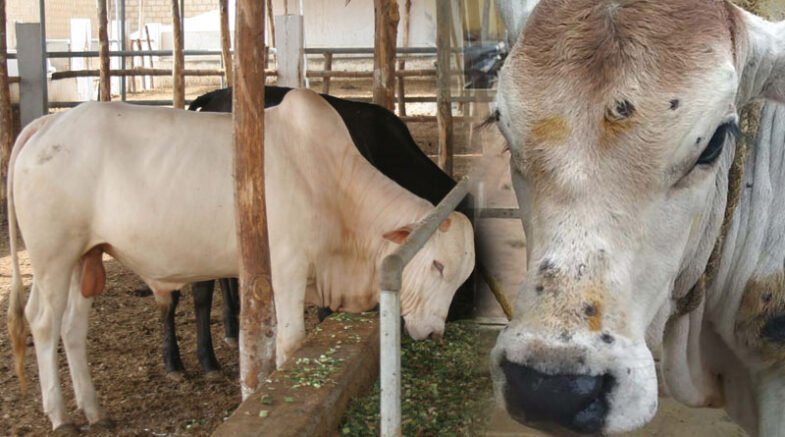Meaningful collaborations between organisations are needed to fully realise Pakistan’s potential for livestock development.

The Food and Agriculture Organization of the United Nations (FAO) Pakistan and the Ministry of National Food Security and Research have launched a project under the Technical Cooperation Programme (TCP) in order to improve the animal disease surveillance system and establish a real-time animal disease reporting system in Pakistan.
The announcement was made during a two-day inception workshop on Wednesday in Islamabad at a nearby hotel.
The livestock sector has not gotten the attention it merits despite its significance in terms of income, trade, employment, livelihood, and nutrition, as well as its share in the agriculture GDP. Meaningful collaborations between organisations are needed to fully realise Pakistan’s potential for livestock development.
Dr. M. Akram, the animal husbandry commissioner for Pakistan’s Ministry of National Food Security and Research (MoNFSR), said in his welcome speech that this collaboration with the FAO under the TCP is a positive development. In order to establish an animal disease surveillance system in Pakistan, it is hoped that the feasibility study will be finished in the following six to nine months.
Although livestock has enormous potential, we only export 350 million US dollars annually. Furthermore, we are unable to meet the local per capita requirements. The majority of farmers who raise livestock do so to supplement their income and are unable to turn their operations into profitable businesses.
This is a major challenge for the MoNFSR because it is Pakistan’s custodian of the livestock industry. Both the productivity and value of our livestock need to be increased. Consequently, this partnership with the FAO is very encouraging.
The first milestone will be the inception workshop, which will let experts discuss issues and learn about the disease surveillance systems that are currently in place in different provinces as well as best practises and lessons learned. The feasibility study will be guided in the right direction by the participants’ insightful suggestions.
Dr. Akram went on to say that the regulatory framework is just as crucial as the disease surveillance system. In accordance with the recommendations of the World Health Organization, the Ministry has created a draught National Animal Health Act.
The attendees of the workshop will be shown it for review. Their suggestions will be included in the final version. It will then be brought up for legislation. If approved, it will be the country’s first document addressing animal health.
Presenting the key points of the feasibility study, Dr. M. Afzal, a livestock expert for the FAO, explained that animal disease surveillance is a systematic process of data collection, analysis, interpretation, and communication for timely evidence-based decision-making, early warning, and taking control of the disease measures.
In order to effectively control disease and set priorities for the resources needed for its prevention and control, accurate and timely reporting of livestock diseases is crucial.
The project aims to enhance Pakistan’s surveillance of animal diseases. Through the use of a tool called the Surveillance Evaluation Tool (SET), which is already in use by many nations worldwide, we hope to evaluate the current surveillance system as part of the project.
Five years had passed since FAO created the tool. This will evaluate the effectiveness and capability of the current systems for monitoring animals. Additionally, previous work for animal surveillance will be evaluated. The ultimate goal is to create a robust animal disease surveillance system for real-time reporting and an IT infrastructure for it that is appropriate for Pakistan.
The FAO representative in Pakistan, Ms. Florence Rolle, thanked everyone for coming to the workshop and noted that FAO has a long history of working with all of the stakeholders in attendance. It is regrettable that Pakistan’s livestock industry does not receive its fair share of the country’s agricultural GDP. It is crucial that FAO investigate this matter in order to fully utilise Pakistan’s potential livestock.
The purpose of the workshop is to know the current animal surveillance system presently working in different provinces, what our capacities are, and where our deficiencies are.
Based on that information, we can develop our policy interventions to address these gaps and problems. Without a surveillance system, we are unable to access global markets or obtain the desired prices. Pakistan has a vast and diverse landscape, and every landscape has its own livestock, species, and gene pool.
This presents a challenge. Due to these various topographies, habitats, species, and pedigrees, animals react differently to various diseases. We won’t be able to fight it if we don’t have an early warning system and accurate information about the disease, how it affects animals, and how we need to react to that.
Only when we have an effective, dependable, and responsive surveillance system will we be able to compete on world markets and provide our farmers with sustainable livestock. Experts in veterinary medicine and livestock management from across Pakistan attended the workshop.
